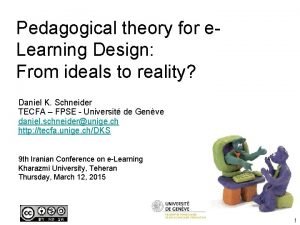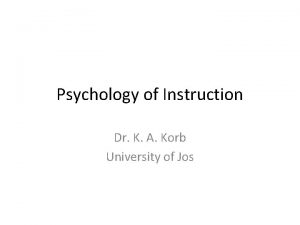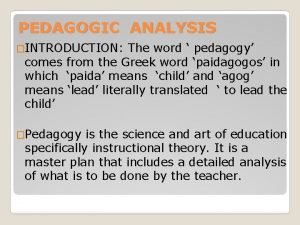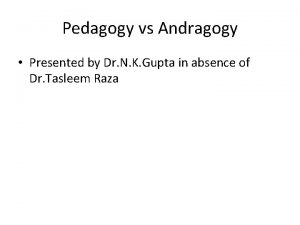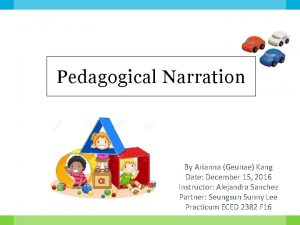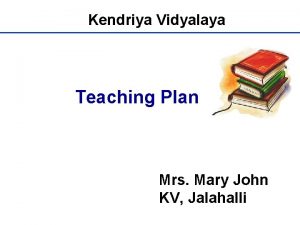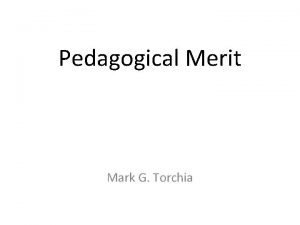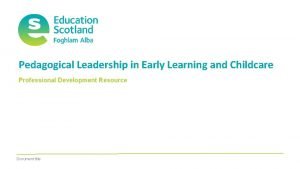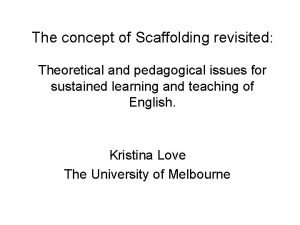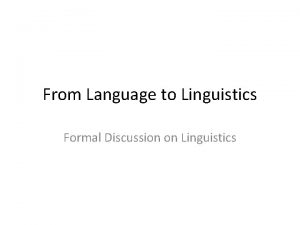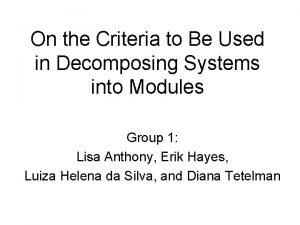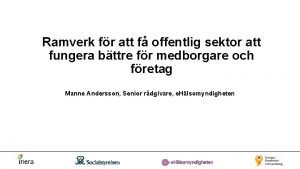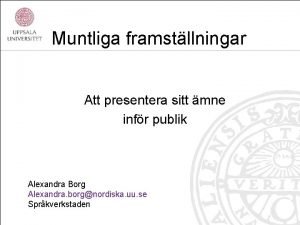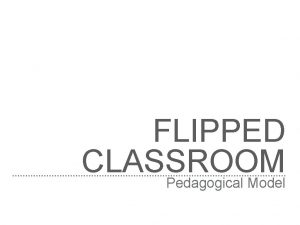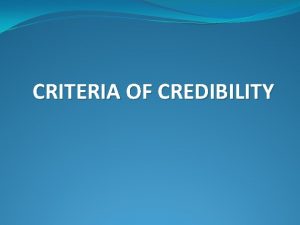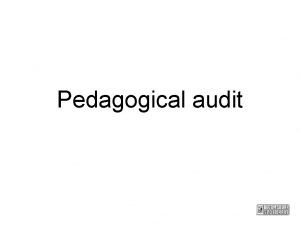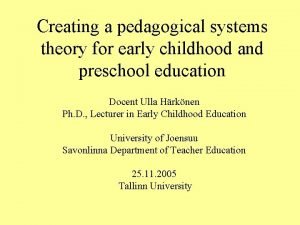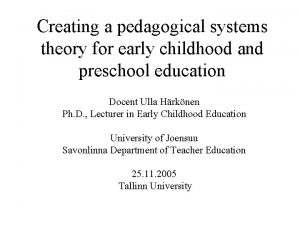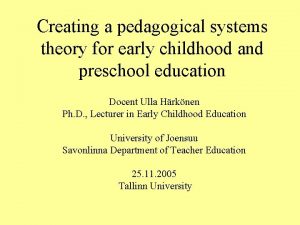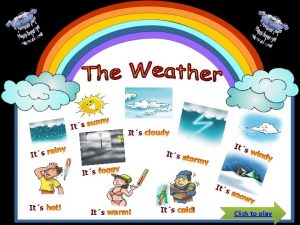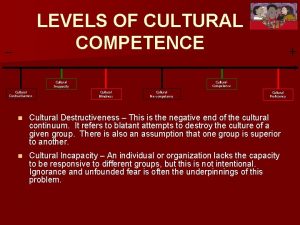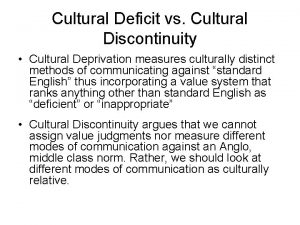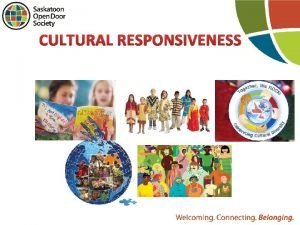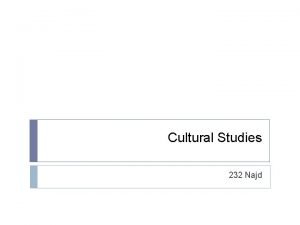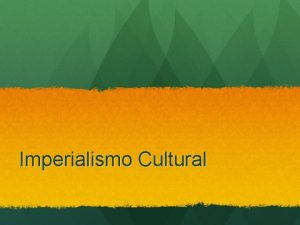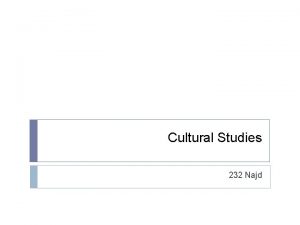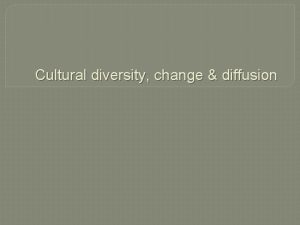PEDAGOGICAL SYSTEMS THEORY AND ITS CULTURAL CRITERIA FOR








































- Slides: 40

PEDAGOGICAL SYSTEMS THEORY AND ITS CULTURAL CRITERIA FOR HUMAN SUSTAINABLE DEVELOPMENT 7 th International JTEFS/BBCC Conference “Sustainable Development. Culture. Education. ” Daugavpils, Latvia May 5 – 8, 2009. Ulla Härkönen Docent, Ph. D. , Lecturer in Early Childhood Education The University of Joensuu Savonlinnan Department of Teacher Education FINLAND

INTRODUCTION 1/3 As a starting point, in this presentation, based on the presenter’s studies, it is first shown 1) the general systems model of early childhood education and preschool thinking • Data: The works of great pedagogues and books written about them (Härkönen 2003 b; 2008)

INTRODUCTION 2/3 • In this presentation it is also pointed out 2) the extensions and intensions of the concept of early childhood education (ECE), based on the presenter’s studies - Data: 12 textbooks and 3 articles (2, 745 pages) from early childhood education and preschool, published over 30 past years in Finland. (Härkönen 2003 a)

INTRODUCTION 3/3 In this presentation the above mentioned results are compared to each others and put to answer the questions 1. What kind of theory the pedagogical systems theory is and what does it tell about ECE? 2. What does extensions and intensions tell about ECE? 3. How do these two results fit together? What do they tell about ECE when they are summed up? 4. What really are the cultural criteria of the systems pedagogical theory? 5. How do the pedagogical systems theory function for human sustainable development?

Problems 1/1 The main questions are: What are the new cultural criteria of the pedagogical systems theory and why and how this theory promote human sustainable development (ECE)?

THEORETICAL FRAME 1/6 about theories • The main theoretical frame of the study is based on the general systems theory and systems thinking (Chekland 1981; Rapoport 1968).

THEORETICAL FRAME 2/6 concepts • Alonzo Church defines the extension and the intension in the Dictionary of Philosophy: • “The ’extension’ of a concept consists of the things which fall under the concept; or, • according to another definition, the ’extension’ of a concept consists of the concepts which are subsumed under it (determine subclasses). ”

THEORETICAL FRAME 3/6 concepts • ”The ’intension’ of a concept consists of the qualities or properties which go to make up the concept. ” (Runes, ed. 1972, 147– 148. • More definitions can be found in the internet: <http: //suo. ieee. org/ontology/msg 02534. html>. )

THEORETICAL FRAME 4/6 concepts • The Finnish researcher Karvonen (2003) has defined the extension and the intension in a very understandable way: • The ‘extension’ or an application area. It must looked at what phenomena in the world will suit the concept or fulfill the criteria given in the intension. ” • ”The ‘intension’ or content: the criteria or a set of signs that is held valid for a given period of time. ”

THEORETICAL FRAME 5/6 concepts and different ways – different views • “People perceive the world through the prism of concepts or, in other words, through the intensions. • People recognize from the world the things that conform to intensions. All that exists in the world distributes in different ways. ” (Translated by the author from the Finnish text: <http: //www. uta. fi/~tierka/S 1 syksy 01 eka/tsld 02 9. htm>).

THEORETICAL FRAME 6/6 Context • Context (language use), the relevant constraints of the communicative situation that influence language use, language variation and discourse

Methods 1/6 • On the basis of the phenomenologicalhermeneutic approach and through the text content analysis I discovered the systems character and the model of the great pedagogues’ educational thinking

Methods 2/6 • Content analysis was needed in analyzing the concept of early childhood education • The question is, how to give a greater conceptual order to specific data? (Strauss, A. L. 1987, 143) • A qualitative analysts may use visual devices such as diagrams, matrixes, tables, and graphs

Methods 3/6 • Model: a particular design or type of product • Model: a simple description of a system, used for explaining how something works or calculating what might happen, etc. a realistic model of evolution (Oxford Dictionary… 2000, 819)

Methods 4/6 • In this study: Cross tabulation between the two verbalized and modelled data • Definition of cross tabulation: To analyze and summarize data. A common example is summarizing the details from database records and placing them into a spreadsheet. (http: //www. pcmag. com/encyclopedia_t erm

Methods 5/6 • Tabulate: to arrange facts or figures in columns or lists so that they can be read easily (Oxford Dictionary… 2000, 1322) • A conventional table: it can be quite simple like the traditionally helpful fourfold table or it can be more complex (Strauss, A. L. 1987, 144)

Methods 6/6 • Many reasearch problems are quite complicated, and working out graphic means for helping to understand them requires innovative imagery and careful consideration (Strauss, A. L. 1987, 144)

Results of the former studies • The next three figures represent the main results of my earlier studies carried out in the constructing process of the new systems pedagogical theory. • (I have also an animation (4 th figure) about the 3 rd figure. )

systems Early childhood education thinking systems Early childhood education science, e. g. theories Systems systems Systems Early childhood education subject systems Early childhood education practice Figure 1. The four extensions of the early childhood education concept as a systems model.

systems Early childhood education thinking care education learning socialization spiritualization teaching development civilization systems Early childhood education science, e. g. theories Systems systems Systems Early childhood education subject systems Early childhood education practice Figure 2. The four extensions and eight intensions of the early childhood education concept as a systems model. Härkönen Ulla 2008 (EECERA_08: spiritualization added)

Views on world Views on human being Views on child Views on society Wies on knowledge Views on education Views on subjects Views on goals Views on basic activities and care Views on play Nursing Hygiene Medicine Nutrition Home economics Views on work Work Play pedagogy Views on teaching Views on methods opened Views on celebrations Views on outdoor education Tourism Entertain- Social sciences Didactics Natural sciences ment Internatio. Arts nalism educational science, developmental psychology, philosophy, sociology early childhood education science Views on planning of pedagogical process of early childhood education Views on pedagogical process of early childhood education Figure 3. The general systems model of early childhood education and preschool thinking (GSM). Härkönen Ulla 2008

Orientation to the results of this study 1/3 • The title of this study is Pedagogical systems theory and its cultural criteria for human sustainable development. • The questions were as follows: What are the new cultural criteria of the pedagogical systems theory and why and how this theory promote human sustainable development (ECE)?

Orientation to the results of this study 2/3 • The results are derived from the qualitative and verbal model of the figure 1 titled The four extensions of the early childhood education concept as a systems model, • and the qualitative and verbal model of the figure 3 titled General systems model of early childhood education and preschool thinking (abbr. GSM) • These models are now crosstabulated.

Orientation to the results of this study 3/3 • The results are seen in the next slide, figure 4, titled The four extensions and new pedagogical intensions as the value contexts of the early childhood education concept, presented as a systems model.

systems Early childhood education thinking Consists of the value contexts of the GSM of ECE systems Early childhood education science, e. g. theories Consists of the value contexts of the GSM of ECE Systems systems Systems Early childhood education subject Consists of the value contexts of the GSM of ECE systems Early childhood education practice Consists of the value contexts of the GSM of ECE Figure 4. The four extensions and new pedagogical intensions as the value contexts of the early childhood education concept, presented as a systems model. Härkönen Ulla 2008

Results 1/9 The value contexts of all the four extensions and the value contexts of the GSM of ECE are also the core value contexts. Inside the core value contexts many different single values can be detected in any culture. In this study it is ´not possible to point out which of the core value contexts might be the most valuable or the most meaningful ones.

Results 2/9 A) Extensions are the core value contexts B) Intensions as the core value contexts • Eight (or seven) intensions are not enough to form value contexts, but they also are the core value contexts: • They are (fig. 2): care, education, teaching, learning, development, socialization, civilization and spiritualization

Results 3/9 • GSM gives the whole pedagogical model and all of its parts are new intensions of the concept of ECE. • Now the GSM forms pedagogical core value contexts • There about twenty (20) contexts as follows: views on world, on human being, on society, on knowledge, on education, on goals, on subjects, (on knowledge areas on subjects), on methods; on basic activities and care, on play, on work, on teaching, on celebrations, on outdoor education, (on knowledge areas on methods), on different sciences, on pedagogical process, on planning process

Results 4/9 * After cross-tabulation pedagogical core value contexts of GSM ought to be found on every one of the four value extension contexts (practice, subject, science, thinking) ; otherwise it is not the question about the concept of ECE

Results in details 5/9 1) Four extensions as the core value contexts: • • ECE practice is a value context ECE subject is a value context ECE science is a value context ECE thinking is a value context

Results in details 6/9 2) GSM and its parts as the core value contexts: • • • Values of views on world Values of views on human being Values of views on society Values of views on knowledge Values of views on education Cont. … 2…………….

Results in details 7/9 Cont… 2 • Values of views on goals • Values of views on subjects • (Values of views on scientific, pedagogical and didactical knowledge areas (which gives knowledge about subjects) (not figured on GSM) • • Values of views on methods Values on basic activities and care Values on play Values on work Values on teaching Values on celebration Values on outdoor education

Results in details 8/9 Cont… 2 • Values of views on scientific, pedagogical and didactical knowledge areas (which gives knowledge about methods (these are figured on GSM) • Values of views on different near sciences • Values of views on pedagogical process • Values of views on planning process

Results in details 9/9 • 3) systemic thinking as the core value context • Systemic relationship between core value contexts is a basic value context • Systemic thinking makes core value contexts open, not closed

Conclusions 1/4 • Existing values in a culture can be studied • While making decisions and while changing educational and pedagogical values negotiation and democratic planning are methods needed in a democratic society

Conclusions 2/4 • In this study values were put under the concept views , which was always written in the plural form • This is because there are many different practical, educational, scientifical and thoughtful ideas inside the mentioned contexts • This kind of theory refers to pluralism, multi-valued, and multicultural societies and different pedagogical ideas

Conclusions 3/4 • The results of this study can be used while analyzing, developing or creating new visions in any value context • For instance: while analyzing the pedagogical ideas of Pestalozzi, Froebel, Steiner, Montessori, Neill, Parkhurst, Freinet, Sukhomlinsky, Malaguzzi, Freire • (this period is 1746 – 1997 = 251 years). All these ideas are largely alive in today’s world

Conclusion 4/4 • While analyzing today’s education, curriculums, thinking of students, educational ideas in education institutions, trends at the universities • While creating new pedagogical approaches, for instance, the pedagogical systems theory • While getting new ideas or rediscovering old ideas again and again

References • • • Checkland, 1981. Systems Thinking, Systems Practice. Chichester: John Wiley & Sons. Strauss, A. L. 1987. Qualitative Analysis for Social Scientists. Cambridge University Press. Härkönen, U. 2003 a. Mitä termit varhaiskasvatus ja esiopetus tarkoittavat? What do the terms Early childhood education and preschool mean? Research reports of the Faculty of Education. The University of Joensuu, 86. Härkönen, U. 2003 b. The new Systems Theory of early childhood education and preschool as a frame for sustainable education. In JTET, Journal of Teacher Education and Training. Vol. 2, 2003. Faculty of Pedagogy and Psychology. Daugavpils University, 25 -38. Härkönen, U. 2008. New pedagogical systems theory and early childhood education culture. In International views on early childhood education, ed. by Härkönen, U. & Savolainen, E. Savonlinna Department of Teacher Education, University of Joensuu. http: //sokl. joensuu. fi/verkkojulkaisut/varhais/harkonen. pdf Härkönen, U. 2008. The Core Value Elements of the Concept of Early Childhood Education. PP-presentation at the 18 th EECERA Conference ”Reconsidering the Basics in Early Childhood Education. Stavanger, Norway 3 rd-6 th September 2008. Conference Programme, 58. Karvonen, E. 2003. Tiedotusopillinen ajattelu ja tutkimus. Käsitteiden ekstension ja intension määrittelyä. Internet 3. 9. 2003. http: //www. uta. fi/~tierka/S 1 syksy 01 eka/tsld 029. htm Oxford Advanced Learner’s Dictionary. 6 th edition, ed. by Sally Wehmeier. Oxford University Press. Rapoport, A. 1968. Systems Analysis: General systems theory. In David L. Sills (red. ) International Encyclopedia of the Social Sciences. Volume 15. The Mac. Millan Company & The Free Press, 452 -458. Runes, D. (ed. )1972. Dictionary of Philosophy. Littlefield, Adams & Company, Totowa, NJ. Internet: http: //suo. ieee. org/ontology/msg 02534. html

Thank you for your attention! Ulla. Harkonen@joensuu. fi http: //joyx. joensuu. fi//~uharkone
 Pedagogical design for e learning
Pedagogical design for e learning Principles of complex systems for systems engineering
Principles of complex systems for systems engineering Elegant systems
Elegant systems Rote memorization
Rote memorization Steps in pedagogical analysis
Steps in pedagogical analysis Pedagogical vs andragogical
Pedagogical vs andragogical Pedagogical translation
Pedagogical translation Examples of pedagogical narration
Examples of pedagogical narration Kostanay state pedagogical institute
Kostanay state pedagogical institute Lesson plan kvs bangalore region
Lesson plan kvs bangalore region Pedagogical pronounce
Pedagogical pronounce Leadership styles in childcare
Leadership styles in childcare Nukus state pedagogical institute
Nukus state pedagogical institute Pedagogical scaffolding
Pedagogical scaffolding Pedagogical approaches to teaching math
Pedagogical approaches to teaching math Azerbaijan state pedagogical university
Azerbaijan state pedagogical university Structured formal discussion
Structured formal discussion The emigree poem analysis
The emigree poem analysis Its halloween its halloween the moon is full and bright
Its halloween its halloween the moon is full and bright On the criteria to be used in decomposing systems
On the criteria to be used in decomposing systems East africa has great cultural diversity because of its -
East africa has great cultural diversity because of its - Kontinuitetshantering i praktiken
Kontinuitetshantering i praktiken Novell typiska drag
Novell typiska drag Tack för att ni lyssnade bild
Tack för att ni lyssnade bild Returpilarna
Returpilarna Varför kallas perioden 1918-1939 för mellankrigstiden
Varför kallas perioden 1918-1939 för mellankrigstiden En lathund för arbete med kontinuitetshantering
En lathund för arbete med kontinuitetshantering Adressändring ideell förening
Adressändring ideell förening Tidböcker
Tidböcker Anatomi organ reproduksi
Anatomi organ reproduksi Vad är densitet
Vad är densitet Datorkunskap för nybörjare
Datorkunskap för nybörjare Stig kerman
Stig kerman Hur skriver man en debattartikel
Hur skriver man en debattartikel För och nackdelar med firo
För och nackdelar med firo Nyckelkompetenser för livslångt lärande
Nyckelkompetenser för livslångt lärande Påbyggnader för flakfordon
Påbyggnader för flakfordon Arkimedes princip formel
Arkimedes princip formel Svenskt ramverk för digital samverkan
Svenskt ramverk för digital samverkan Lyckans minut erik lindorm analys
Lyckans minut erik lindorm analys Presentera för publik crossboss
Presentera för publik crossboss
